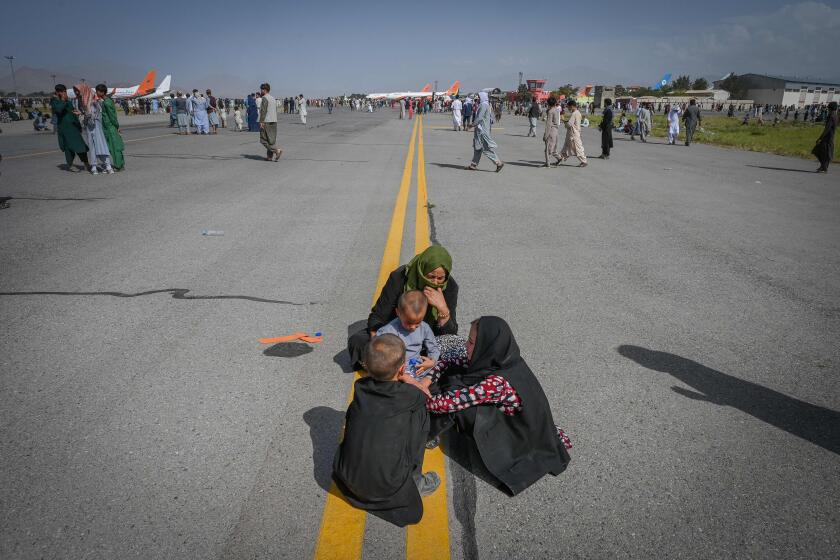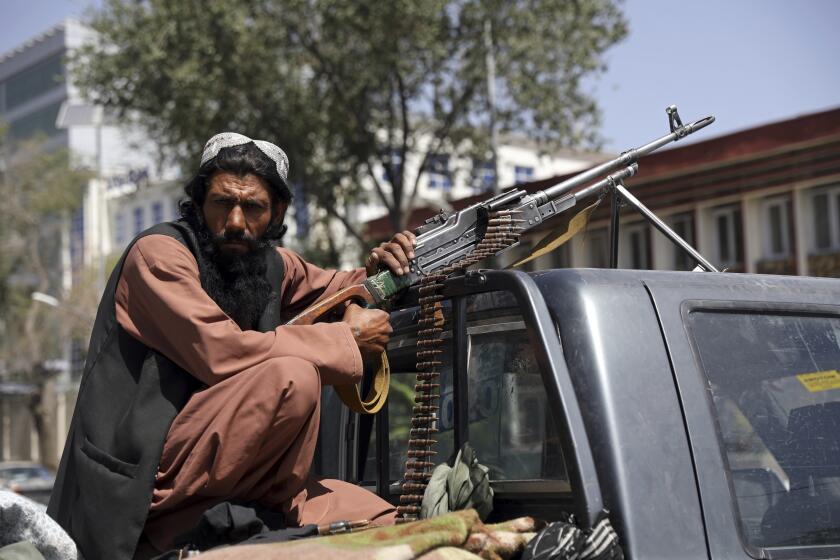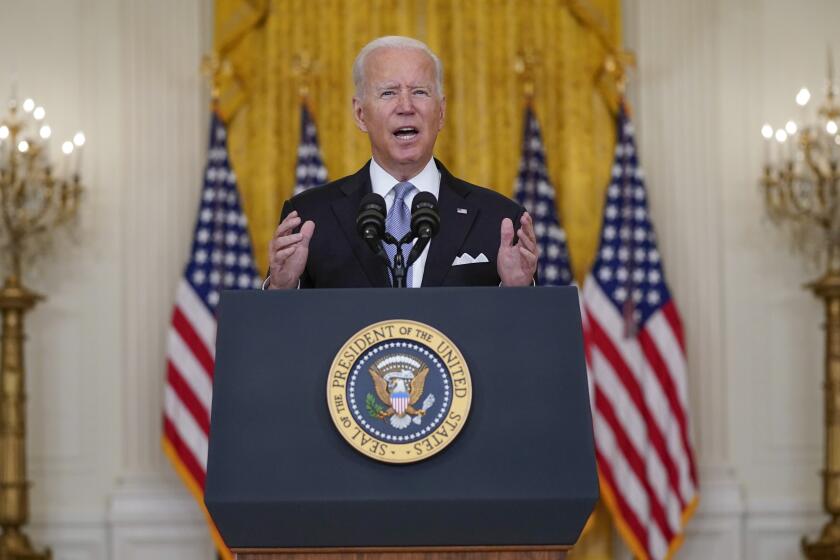American TV ignored Afghanistan. Until parachuting in to watch it fall
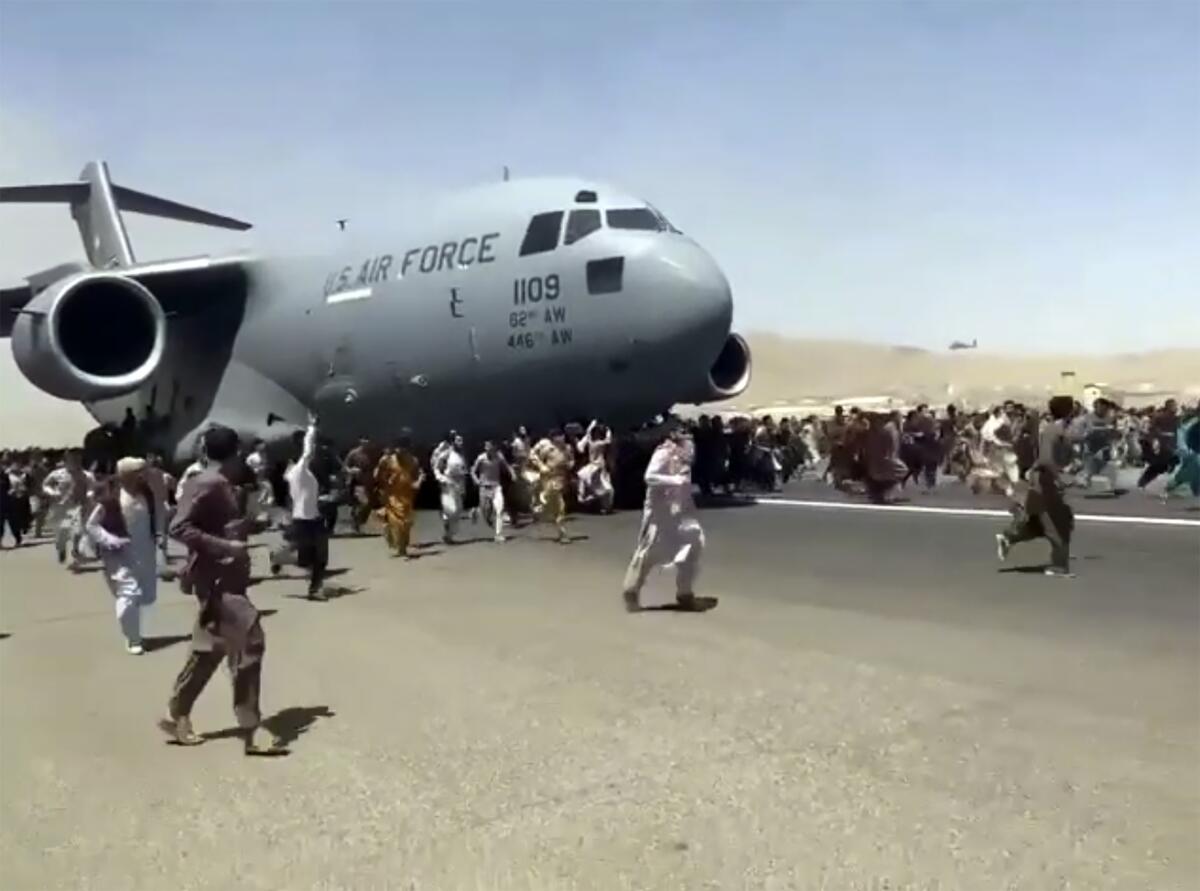
- Share via
The sudden end of America’s longest war was marked this weekend, and into Monday, by indelible footage of Afghans crowding the Kabul airport, clinging to the outside of a U.S. military aircraft in a frantic attempt to flee Taliban rule after the rapid collapse of their country’s government. Desperate men held the plane’s fuselage as it taxied down the runway, rolling off onto the pavement as it picked up speed. Moments after takeoff, two objects dropped through the sky, presumed to be bodies.
As I write this, the fall of Afghanistan, and the conclusion of a 20-year engagement in the region that began shortly after the attacks of Sept. 11, 2001, is being captured in dramatic detail across numerous platforms by multiple news organizations, many of which have appeared stunned by the turn of events. Who could have predicted this, they’re asking?
War correspondents, foreign bureaus and Afghan stringers, for starters. You know: actual journalists.
Afghans panic and try to flee Monday after Kabul fell to the Taliban
The shrinking of American newsrooms since their heyday in the 20th century and the country’s fatigue after two decades of war have created a media ecosystem whose bread and butter is domestic crisis and political rancor, presented by opinionated anchors and argued by divisive personalities.
By contrast, covering U.S. conflicts in Afghanistan, Iraq and other locales around the globe has been a sporadic effort at best. The media parachute in when our troops invade countries overseas or leave them in defeat, while remaining largely absent for the slog in between. When a major story broke out in combat zones, it was commonplace in these interim years for outlets to use Al Jazeera or Al Arabiya reporting and camera footage from places where they weren’t — like Kandahar Province, Fallujah and other hotspots where our troops risked and lost their lives. Beyond the grim spectacle of “shock and awe” and the killing of Osama bin Laden, if you watched the nightly news — or even 24-hour cable news — in the last two decades, you might be forgiven for believing America’s last major war took place in Vietnam. That’s how intermittent the attention has been.
Watching this weekend as Afghanistan fell under Taliban rule, again, was horrifying — particularly the footage of victorious fighters pouring into Kabul unchallenged, and the humanitarian crisis unfolding around the airport, which may well indicate even greater terror and dread throughout the rest of the country. But for all the valiant efforts of those on the ground there relaying the news, much of American TV seemed ill-prepared to take on such a grave and complex series of events. CNN scrambled to dig up experts on foreign policy and conflict such as Fareed Zakaria, who looked like he was on vacation in a cabin in upstate New York. Viewers learned that MSNBC does in fact have an Iran bureau chief, Ali Arouzi, though you might not have known it as recently as last week. They patiently explained that this disaster has been building for more than a decade, over four different presidencies — something one might have expected to glean from, say, watching the news.
The Taliban has regained power after nearly 20 years. Here’s what that can mean for average Afghanis.
Other experts were called upon to address the humanitarian crisis, namely the assertion that the U.S. was not swift enough to extract Afghan interpreters and others who had aided U.S. troops out of the country. Fox News featured comments from Norman Roule, former Middle East expert for the CIA, but spent a good deal of the day ripping the president via contributors such as Ben Domenech of the Federalist. And they had a lot to work with.
In July, when President Biden announced a timeline for the drawdown in Afghanistan ending on Aug. 31, he ensured reporters it would look nothing like the scramble during the fall of Saigon in 1975. “There’s going to be no circumstance where you see people being lifted off the roof of an embassy of the United States [in] Afghanistan. It is not at all comparable.” Circulating across the news Sunday and Monday: Images of an evacuation effort from the rooftop of the American Embassy in Kabul that looked eerily similar to those shot in Vietnam 40-odd years ago.
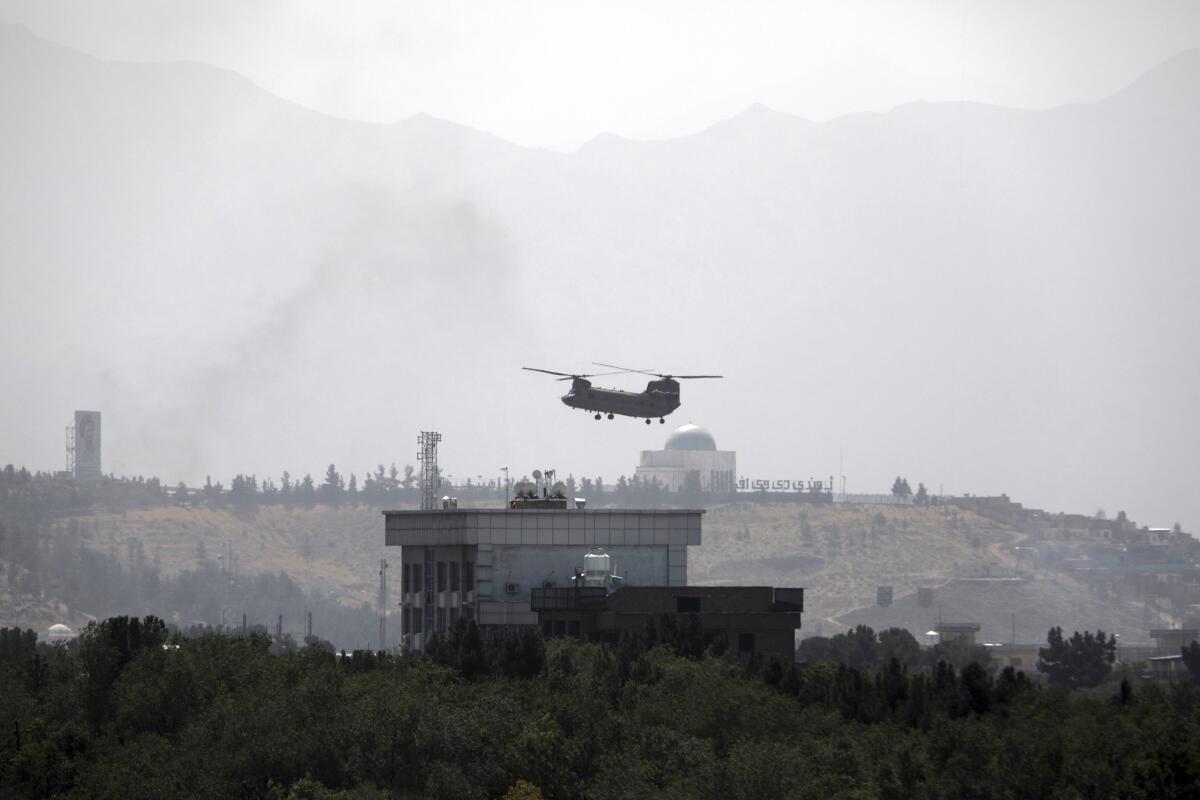
In Vietnam, at least, TV was instrumental in bringing U.S. viewers information about the war and, many have argued, turning them against it. TV coverage of Afghanistan has been so sparse since the war’s earliest days it’s been hard to know what message the networks were sending, except about its unimportance.
“I am the president of the U.S. and the buck stops with me,” Biden said in a speech Monday, addressing the criticism that he’d made a grievous error by pulling troops out, and that the events unfolding in Kabul were proof of that miscalculation. “I do not regret my decision to end the war in Afghanistan.
President Biden addressed the American people about the messy U.S. pullout from Afghanistan. He stood by his decision and said there was no good time to leave.
“Our mission in Afghanistan was never supposed to have been nation-building ... there was never a good time to withdraw U.S. forces,” he added. “The events we are seeing now are sadly proof that no amount of military force would ever deliver a stable, united, secure Afghanistan, that’s known in history as the graveyard of empires. I will not mislead the American people by claiming that just a little more time in Afghanistan will make all the difference.”
But the stark reality of a no-win war, and a no-win political situation, didn’t make the news out of Afghanistan any less heart-wrenching. Al Jazeera broadcast the “handover ceremony” at the presidential palace, which passed from what was left of the Afghan government to the Taliban. Reports came into MSNBC that the Taliban was already going door to door, looking for Afghans who helped the U.S., journalists and those dedicated to human rights causes.
It was the tragic end to a messy war and occupation — most of which was never broadcast.
More to Read
The complete guide to home viewing
Get Screen Gab for everything about the TV shows and streaming movies everyone’s talking about.
You may occasionally receive promotional content from the Los Angeles Times.
